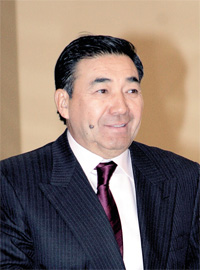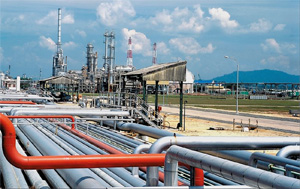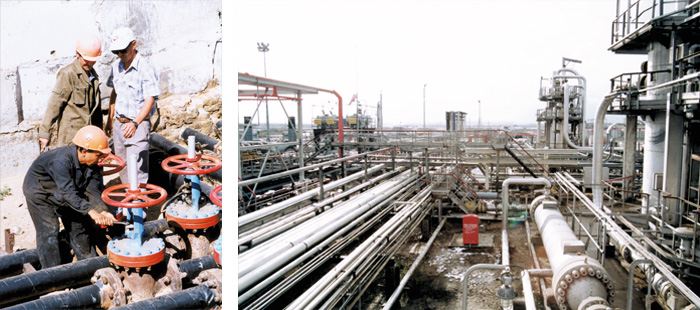Petroleum 20 years: the best
Nurlan Balgimbayev: Privatization of Kazakhoil is Currently Unprofitable for the State

President of the NOC Kazakhoil Nurlan Balgimbayev answers the following questions for Petroleum.
- Nurlan Utebovich, one year has passed since the time you returned to the post of the head of Kazakhoil. This was happened against the background of the growing world oil prices. How far are the company's successful financial indices associated with this fact?
- The company achieved such high results primarily due to the change in the style of management. Since 2000, an integrated approach in management of production and finance has been introduced in the company, luckily there are high potentials for it. The company strengthened its control over expenditures and economized on the foreign exchange earnings. The improvements in financial management made it possible to increase the branch's budgetary payments. As a result of this policy the state received taxes from Kazakhoil 3.3 times higher compared with the same period of the previous year. The increase in the world oil prices has certainly played its positive role, but during this time its average price increased only by 2.2 times.
The Kazakhoil's activities became transparent. About this testify the international credit rating received by the company in late September. This summer the company issued bonds on the domestic security market amounted to $25 million. Our bonds are in high demand among pension funds, banks and physical entities. The results of placing speak about the trust in Kazakhoil of representatives of domestic market who borrow such amount for a period of two years.
Alongside with it the financing of social programs has been considerably increased. The company has allocated more than 4.7 billion tenge for housing construction, improvement of working conditions, water supply and infrastructure facilities.
According to the Head of the State's order, since the year 2000 Kazakhoil transferred to the new system of labor enumeration. For this period the salary of oil workers, many thousand members of staff, increased almost twice and currently is averaged at 50 thousand tenge.
- Lately, the representatives of the deputies' corps and mass media arise the issue about the necessity of establishing the Ministry of Oil and Gas Industry. You once were a minister, so you are thoroughly familiar with the problem. Have you any comments to make on such proposals?
- Perhaps, it should be better to answer to the question: who will profit from this? The deputies just sound the proposals coming from the interested circle of persons. The wide spread opinion that with the establishment of the ministry the Republic will avoid the problem with the provision of fuels is only a myth. It is very important to learn how to manage and use the existing levers of impact instead of creating the new portfolios and warm places for bureaucrats. The establishment of the ministry would be justified if the oil industry is under a full control of the state. However, this step has been made already at the initial stage of formation of the Republic's oil industry as a branch of the national economy. After the reformation and privatization processes the state regulation of the oil industry was not possible in full measure, and this role - the protection of the Kazakhstan's economic interests - was given to Kazakhoil. With the same aim the company's objectives are provided in the contracts on such large projects as Tengiz, Karachaganak, North Caspian, and etc. At present, the relationship between foreign companies and government bodies are regulated through contracts, so at this stage there is no need for creation the Ministry of Oil and Gas Industry.
- Kazakhoil was once founded in the form of the national company designated to conduct a state policy and protect the national interests in the oil and gas sector. How does the company manage today to fulfill its obligations?
- Kazakhoil succeeds in conducting the state policy and protecting the national interests in the oil business. I think that at the current stage of the Kazakhstan's economy development it is important for a state to concentrate its best assets and experience in the form of national companies. This gives the opportunity, firstly, to define fairly and competently the forms and conditions of attracting foreign capital; and secondly, to take control over the fulfillment of obligations taken by investors. For example, at the JV Tengizchevroil the works have been commenced on import substitution program and to provide domestic producers with orders. Thirdly, the state should always think about its own production and resource base and domestic operators, who can give reasonable odds in a competition with foreign operators. The domestic operators should be given an access to new technologies in organization of production and management; in other words, to learn to work effectively like the leading foreign companies. The national companies per se should be that areas of growth on which the new and more effective economy of Kazakhstan will be build in the future. As for Kazakhoil, its assets and incomes would be increased with the growth in oil production.

The Kazakhoil's share of oil production will come to 5.8 million tons this year, or 17.3 % of the Republic's planned oil production estimated at 33.4 million tons. Given the level of plants' filling, it turns out that the company provided the third of domestic deliveries of raw materials to the Republic's refineries.
Currently, we are starting to implement the principle "from well to the gas station". The company is planning to build a net of brand gas stations throughout the country. We hope that by the end of this year our efforts could be fully appraised by drivers who will buy benzine without mediator's margin. The same can be said about the consumers of liquefied gas after when the company will complete the creation of a vertically integrated structure.
- What is your attitude to creation of an Oil Fund? Are we threatened a "Dutch disease" at the current level of the economy's development? Is it better to allocate money, gained from the deal with Chevron and directed to the fund, to the real sector? For example, to the reconstruction of the Atyrau Refinery?
- Certain preconditions to the appearance of the above mentioned disease would appear if the incomes gained from the mineral resources exploitation were fully directed to the budget. That is why it is said that the formation of the Fund will be made on account of incomes from the development of oil fields, or other mineral resources, and earnings from privatization of the state property. The National Fund is necessary to fulfill the following three functions: to reserve, accumulate and invest. All this will make it possible to avoid the negative consequences of the "Dutch disease," when the country's economy is becoming one-sided and it is profitable to produce only oil. We should not to allow permit Kazakhstan to be a raw material supplier, who is eating up the money earned from export.
If we are going to increase production of oil given the current world market conditions than the project for creation the national fund of the Republic of Kazakhstan will be just to the point. As for the use of earnings, gained from the sale of the Kazakhstan share in JV Tengizchevroil to Chevron, this question should be settled by the leadership of the country and its government.
The talks about the reconstruction of the Atyrau Refinery has a many-year history. It's good that in the August of 2000 the agreement was concluded that meets the interests both Kazakhstan and Japan. We distributed the financial risks and interested the Japanese investors to implemente this project as quick as possible. After lengthy negotiations the cost of the reconstruction was reduced from $412 million to $308 million. The loan has a three-year grace period with the 5 % rate of interest for 13 years. The deputies and the government should be guided here by the principle: this loan requires guarantees in order to start the modernization of the Atyrau Refinery, the oldest in the Republic, as soon as possible.

- Since we start to speak about the reconstruction of plants what is the logic of investing the means of the NOC Kazakhoil into foreign productions, e.g., Kherson Refinery, and using the loans to set our enterprises on its feet?
- The foreign-policy aspects of current relationships between Kazakhstan and the Ukraine help to promote development of strategic plans of Kazakhoil, which include, among others, the development of foreign markets. It's necessary to use this opportunity - the outlet to the prospective oil market of the Ukraine given its geopolitical situation and future integration with the European Community. The Government of the Ukraine announced a tender for the sale of a controlling block of shares in the Kherson Refinery, and Kazakhsoil participates in it. The interest to this object is great because the plant is standing on "the water", and we are not the one and only who needs a base for exit to the European market.
At present, Kazakhoil fulfils not only the intergovernmental agreements, i.e., provides a stable oil delivery to the plant in exchange of the block of shares transferred to the trust management. The loading of capacities has stabilized the financial state of the Kherson Refinery and allowed the enterprise to conduct a partial modernization and renewal of equipment on its own funds. That is, Kazakhoil spent no money on reconstruction of the Kherson Refinery, and the investments will be needed if Kazakhoil win a privatization tender. It should be also mentioned that the level of production capacities at the Kherson Refinery exceeds the same indices of the Atyrau Refinery: the enterprise's fixed assets are less deteriorated, so the volume of required capital investments will be less.
Refuting the conjectures about the re-export at reduced price, I would like to stress that oil to the Ukraine was delivered at a price 2 times higher compared with domestic, i.e., $140 per ton.
- In the recent time the government is actively conducting the revision of the earlier signed contracts on subsoil use. The matter has not yet reached the point of cancellation of contracts, however, according to available information the talk is about the suspension of some licenses' validity. How can you comment these processes?
- I think that these processes should take into account the prestige of the investment climate in the country. The government should adopt a correct approach expressed in inspection of contract obligations. Strict measures should be undertaken towards investors who fail to fulfill their obligations under the contract, which include the cancellation of contracts and withdrawal of licenses. However, it is very difficult now to make any comment on this question as NOC Kazakhoil has no right to revise and reconsider the contracts.

- Just a few days ago a large contract on Karachaganak has been concluded. What other large contracts are under negotiation?
- As it was mentioned in the press, the contract on Karachaganak symbolizes the approach which is being actively introduced by Kazakoil in the projects controlled by it, i.e., to provide a maximal participation of the Kazakhstan companies and provide budgetary and other statuary payments to the budget. This, the so called 'local content' principle will be the basic matter of negotiations on the new projects. Under development are two production sharing agreements with Oman Oil Company on the Blocks 15-16 and the project with Chevron on Kurmangazy Block. The technical and commercial conditions of these agreements are currently in process. You will know the details of these transactions in early 2001 after signing the contract.
- When will be approved the program for development of the Caspian Sea shelf. Would the next blocks be offered for tender and when?
- This year for Kazakhstan is marked by an important event. In July OKIOC announced the discovery of oil at Eastern Kashagan. Thus, a many-year dispute over the presence of oil at the Kasakhstan Caspian Sea shelf come to the point. Since now, we should pass to another stage of development of offshore operations: evaluation, development and production of oil at the Caspian and creation of necessary service infrastructure. Plenty of work has been conducted by Kazakhoil in this direction. Within two years the company was engaged in evaluation of prospects of the Kazakhstan sector of the Caspian Sea. Five groups of blocks with different potential were identified with the primary projects being designated. All this work is included into the company's development programs on offshore oil operations and production infrastructure on the Caspian shelf up to 2006. The program stipulates the primary objectives of the Kazakhstan's government and the company Kazakhoil as an Authorized body to develop the offshore oil and gas complex. For Kazakhoil these objectives include the control over projects on the sea blocks' development; elaboration of the strategy and implementation of projects on creation of appropriate infrastructure; and training of personnel to conduct offshore operations.
A special attention is given to the issues on preservation of the unique ecosystem of the North Caspian. The basic statements of the draft Program were already submitted to the leadership of the country and are currently under consideration.
- Will be the NOC Kazakhoil privatized?
- The issue on privatization is in the competence of the Kazakhoil's shareholder, in this case, the state. It is quite natural that if the owner at some moment will consider it necessary to sell the part of its property, as a more efficient placing of its capital, than it offers this share for sale. But it should be stressed that at present, given the growing cost of oil assets, the privatization of NOC Kazakhoil is not profitable for the state.
Petroleum # 5 (5), 2000



